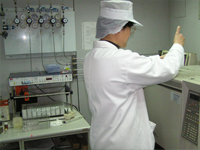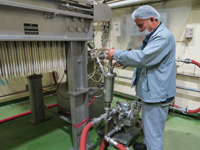 Advantages of HERPEPSTM Platform:
Advantages of HERPEPSTM Platform:
Clean:
Simpson Biotech’s HERPEPSTM leverages Starch Binding Protein (SBP) as a fundamental component of its system. By utilizing Starch Binding Protein, HERPEPSTM offers unique endoprotease de-tagging and an incredibly clean expression solution. Endoprotease detagging provides the powerful advantage of clean-cut, tag-free protein products. The disposable de-tagging sub-system reduces contamination during purification. HERPEPSTM uses a proprietary Starch-Binding Protein (SBP) affinity tag that can be de-tagged by a patent pending process via SBP-tagged endoprotease to produceclean-cut recombinant proteins. HERPEPSTM can also be adapted to customer specifications to work with other commercially available processes and produce the same clean results.
 Versatile:
Versatile:
Simpson Biotech’s HERPEPSTM is extremely versatile. Proteins have been successfully expressed in a wide range of host systems including P. pastoris, S. cerevisiae, E. coli, baculovirus, and others. Simpson Biotech possesses exceptional know-how in pichia hosts, where Simpson Biotech’s proprietary SEC-4 secretion factor can increase secretion and yield. The proprietary Starch-Binding Protein (SBP) is incredibly versatile as an affinity-tag. The protease cleavage using the proprietary endoprotease de-tagging system can optimize expression and minimize handling in a range of highly customized systems.
Economic:
Simpson Biotech’s HERPEPSTM boasts very high fermentation titres. Titres can be greater than 10g/l, for example, in Pichia. Recovery rates are very high, with greater than 70% in initial prototyping and greater than 90% efficiency in laboratory production scenarios and scale-up. Ultimately HERPEPSTM efficiency allows for significant cost savings. Poorly-expressed proteins can now yield larger batches. The low cost of starch resins can help you maintain your budget. Using Starch Binding Protein as an affinity resin can significantly reduce production costs. In scenarios such as the production of phytases for feed enzymes where no de-tagging process is required, costs can be reduced to under $1.50 / gram.
